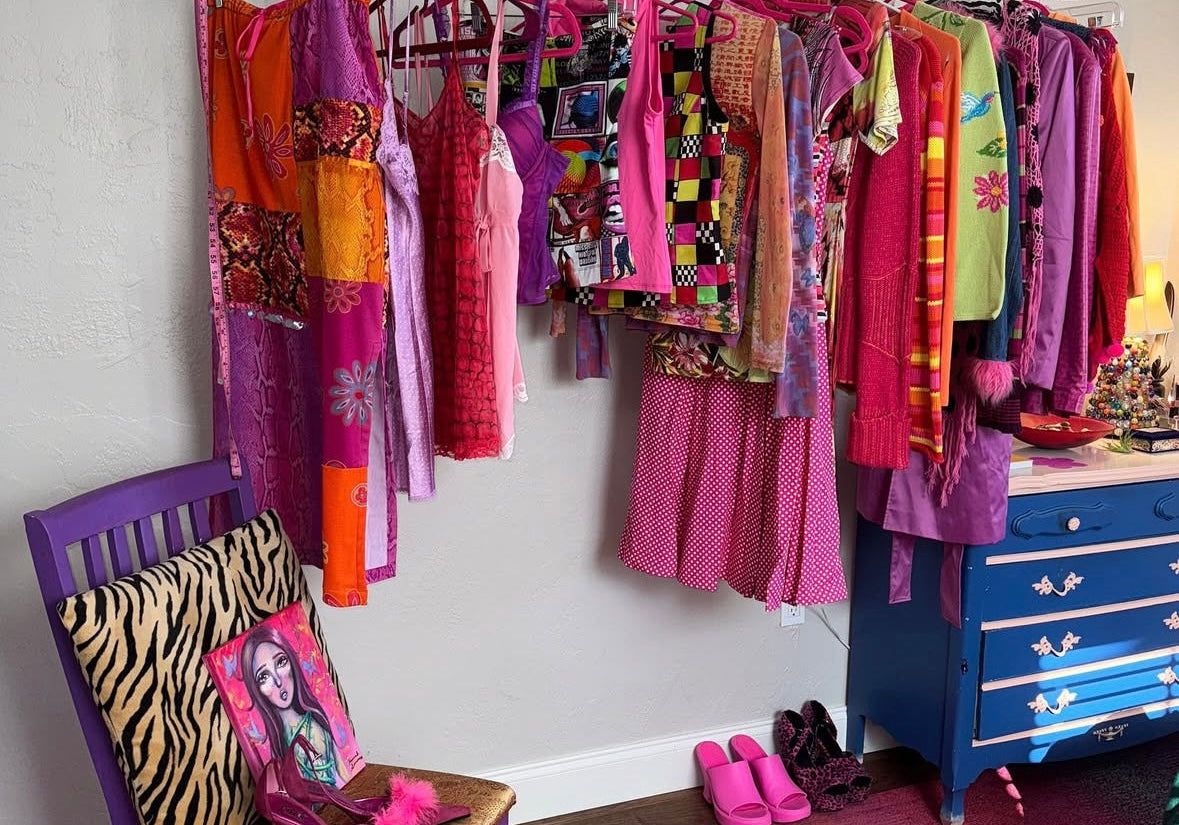Living Consciously

Living consciously isn’t about being perfect—it’s about having awareness and living life with intention.
It’s about understanding how our everyday actions affect the world around us, making small changes where we can. Those little actions might seem insignificant, but when millions of us make them, they add up. From the clothes we wear to the food we eat, every choice we make impacts the planet’s future.
______________________________________________________________________
Choices in Clothing
Did you know the fashion industry produces over 100 billion garments each year? And most of them end up tossed out within just a year. That adds up to 92 million tons of textile waste, polluting oceans and landfills. On top of that, the production of these clothes releases harmful chemicals that contribute to climate change and damage water supplies.
92 million tons = the weight of 5,300 Eiffel Towers or 3 million blue whales. If you spread it out, that much textile waste could cover the entire United States.
Where does it all go?
Landfills: Over 80% of discarded textiles end up in landfills or get burned. These materials can take up to 200 years to decompose, releasing harmful chemicals into the air, water, and soil. Even worse, when they're burned for energy, they let out carbon dioxide and toxic chemicals.
The sad reality is that many of these landfills are located in developing countries, where they directly impact local communities. People living near these dumps face serious health risks, including respiratory issues, contaminated drinking water, and environmental degradation. It’s not just the planet that suffers—it’s the people who live closest to the waste. These communities often lack the resources to protect themselves, making them vulnerable to the long-term effects of the fashion industry's waste.
Recycling Centers: Less than 1% of textiles are recycled into new products. Some might get repurposed for things like insulation or cleaning rags, but most fabrics aren’t designed for recycling. This is because they’re made from mixed fibers (like cotton and polyester), which makes the recycling process a nightmare.
Donations & Thrift Stores: Sure, some clothes end up at second-hand shops, but a lot of that still goes unsold or gets tossed out because fast fashion doesn’t hold up well after a few wears.
Plus, let’s not forget the human cost
Many of the people making our clothes work in dangerous, poorly paid conditions. That’s why choosing sustainable brands, second-hand clothing, or simply buying less can really make a difference. Every piece of clothing has a story, and it’s up to us whether we’re part of a positive or negative one. No item is worth someone else's freedom and livelihood.
One thing that really doesn't sit well with me—when billionaires run companies that don't ensure fair treatment for everyone along the supply chain.
How can you reduce your impact here?
Cut it out completely: Opt for second-hand or vintage shopping. Thrift stores, consignment shops, and online resale platforms are great places to find unique, high-quality items without contributing to the demand for fast fashion.
Cut back: Choose sustainable brands that focus on ethical production, use eco-friendly materials, and offer timeless pieces. Buy less, but invest in better quality that will last longer.
______________________________________________________________________
Electronics: Their True Cost
Phones, tablets, and all the gadgets we can’t live without—what’s the true cost?
The production of electronics, especially smartphones, involves forced labor, like the Uyghur Muslim labor camps in China, and devastating environmental impacts. Mining for minerals destroys ecosystems, and electronic waste leaches toxic chemicals into the soil and water.
But the cycle of buying and discarding gadgets doesn't stop there. While we’re constantly upgrading, both people and the planet pay the price.
How can you reduce your impact here?
Cut it out completely: Commit to holding onto your electronics for longer and focus on repairs when needed. Instead of upgrading every time a new model comes out, consider a refurbished or older model.
Cut back: Recycle your old electronics responsibly through certified e-waste programs and purchase from companies that support ethical manufacturing and sustainability initiatives. Only buy new when absolutely necessary or more sparingly.
______________________________________________________________________
Eating Habits
Here’s a staggering fact: the global meat industry wastes over 20% of the meat produced each year, which means 12 billion animals are raised for food and never eaten. Cutting meat consumption by just this much could save millions of acres of land, reduce emissions, and ease the strain on our natural resources.
Reducing the land used to raise 12 billion animals for food would have major environmental benefits:
- Animal agriculture uses 70% of agricultural land globally.
It takes about 2.5 acres of land to raise a single cow for one year.
12 billion x 2.5 = 30 billion acres (13 times the size of the U.S.'s entire land area) of land that could be freed up.
This would be a massive reduction in land use, allowing for reforestation, growing more plant-based foods, and promoting biodiversity.
- 1 pound of beef uses about 1,800 gallons of water
1 cow produces about 400 pounds of beef.
Each cow requires 720,000 gallons of water for its entire life.
-
Livestock farming accounts for 14.5% of global greenhouse gas emissions.
Of that, cattle (which produce methane) are one of the biggest contributors. This reduction would have a major positive effect on mitigating climate change, cutting emissions from one of the highest sectors of global greenhouse gases.
Processed foods contribute to landfills due to single-use plastic packaging. They also contribute to deforestation. I’ll dive into palm oil more below.👇
How can you reduce your impact here?
Cut it out completely: Being vegan or plant-based is not only kinder to the environment but also uses significantly less land and water than meat-based diets. Cut out processed foods.
Cut back: Choose to go meatless a few days a week (e.g., Meatless Mondays). If you do eat meat, opt for sustainably sourced options, such as pasture-raised or locally sourced meats, and be mindful of portion sizes. Be mindful of processed food intake as well. Opt for bringing your own produce bags to the store to further reduce single-use plastic.
______________________________________________________________________
Deforestation and Its Far-Reaching Effects
Deforestation is one of the biggest environmental problems we face. Industries like agriculture, logging, and palm oil production are tearing down forests at an alarming rate. Every year, millions of acres of forest are destroyed to make room for crops like soy and palm oil, and for cattle to graze.
But here’s the kicker: these forests aren’t just pretty—they’re essential for life on Earth. They store carbon, help regulate the climate, and support biodiversity. When they’re cut down, not only do we lose all that, but the carbon stored in the trees is released back into the atmosphere, making climate change worse.
Every year, millions of acres of forest are cleared to make way for soy, palm oil, and cattle grazing. Biodiverse forests [variety of trees] are replaced with monoculture plantations [one type of tree], creating an unvaried environment that cannot support the complex life forms that once thrived there, such as orangutans and countless other species.
Year 1937
World Population 2.3 billion
Remaining Wilderness: 66%
Today 2024
World Population 8 billion
Remaining Wilderness: 35%
2/3rds of the orangutan population has been wiped out in recent decades.
Between 1999 and 2015, the populations of Bornean orangutans alone declined by 55%, largely due to habitat destruction from palm oil plantations.
How can you reduce your impact here?
Cut it out completely: Avoid products that contain palm oil unless they're certified as sustainably sourced (look for the RSPO certification). Research brands that prioritize deforestation-free practices.
Cut back: Reduce your consumption of packaged and processed foods, as these often contain palm oil. By focusing on whole, plant-based foods, you naturally cut back on palm oil without sacrificing convenience.
______________________________________________________________________
Skincare and Makeup
A lot of skincare and makeup products out there are full of ingredients that harm both our health and the environment. Microplastics, for example, are terrible for marine life, and animal testing is still a thing.
Choosing cruelty-free and eco-friendly products makes a huge difference. Look for brands that use clean, ethically sourced ingredients and packaging that won’t end up in a landfill. Every little step counts.
How can you reduce your impact here?
Cut it out completely: Switch to clean, cruelty-free, and environmentally friendly beauty brands. Look for products that use minimal or recyclable packaging, and focus on multipurpose items to reduce waste.
Cut back: Avoid products with microplastics, harmful chemicals, and excessive packaging. Opt for refillable or recyclable packaging options, and when possible, simplify your routine to use fewer products.
______________________________________________________________________
Living consciously is about making intentional choices in my everyday life, and here’s how I’m currently doing it:
- I thrift 95% of my clothing and purchase damaged items to rework into something new for Energy Angel.
- For packaging, I'm using what I have left of my poly mailers and then I'll be switching to fully recyclable packaging.
- I avoid buying from conglomerates that exploit workers. I rarely shop on Amazon and don't have a prime account—when I do, it's for things I can't find elsewhere. I prefer to support smaller businesses and my local community. I use the No Thanks app for this <333
- I'm still on my iPhone 11, and when the time comes for a new one, I'll opt for a refurbished model instead of buying brand new.
- I’m more mindful of the meat I cook, both at home and when I dine out. While I enjoy meat, I strive to reduce waste and buy locally sourced, sustainable options whenever possible. I also minimize palm oil in my purchases.
- I never use single-use plastic bags for produce and try to be more mindful of bringing my own totes to the store. I’m not always perfect here but am definitely trying to be better because it really is such an easy change.
- I focus on using ethical skincare products free from harmful chemicals. I use the Yuka app for this <333
These choices may seem small, but they’re my way of contributing to a healthier, more sustainable future, one conscious decision at a time.
SOURCES:
Documentary: David Attenborough: A Life on Our Planet
[Watch when you don't mind crying or being sad 😢]
Documentary: Cowspiracy: The Sustainability Secret
Environmental Protection Agency (EPA): Data on textile waste
https://worldmetrics.org/fast-fashion-statistics/
Amnesty International: Reports on forced labor in tech supply chains
https://mit-serc.pubpub.org/pub/w9ht6hue/release/5
FAO (Food and Agriculture Organization): Reports on food waste and environmental impact
- Tags: lifestyle sustainablitity
1 comment




I absolutely love this article! I’m going to share this with friends and family.
I like that you touched on a variety of topics to discuss conscious living from a rounded perspective.
I sometimes wonder if unethical consumption can create “blind karma” that comes back to bite us even when aren’t aware of the impact of our purchases.
Also, a fun idea with the holidays coming up:
I do something called “thriftmas” with my family where we have to thrift or regift for a Yankee swap instead of buying new gifts for everyone.